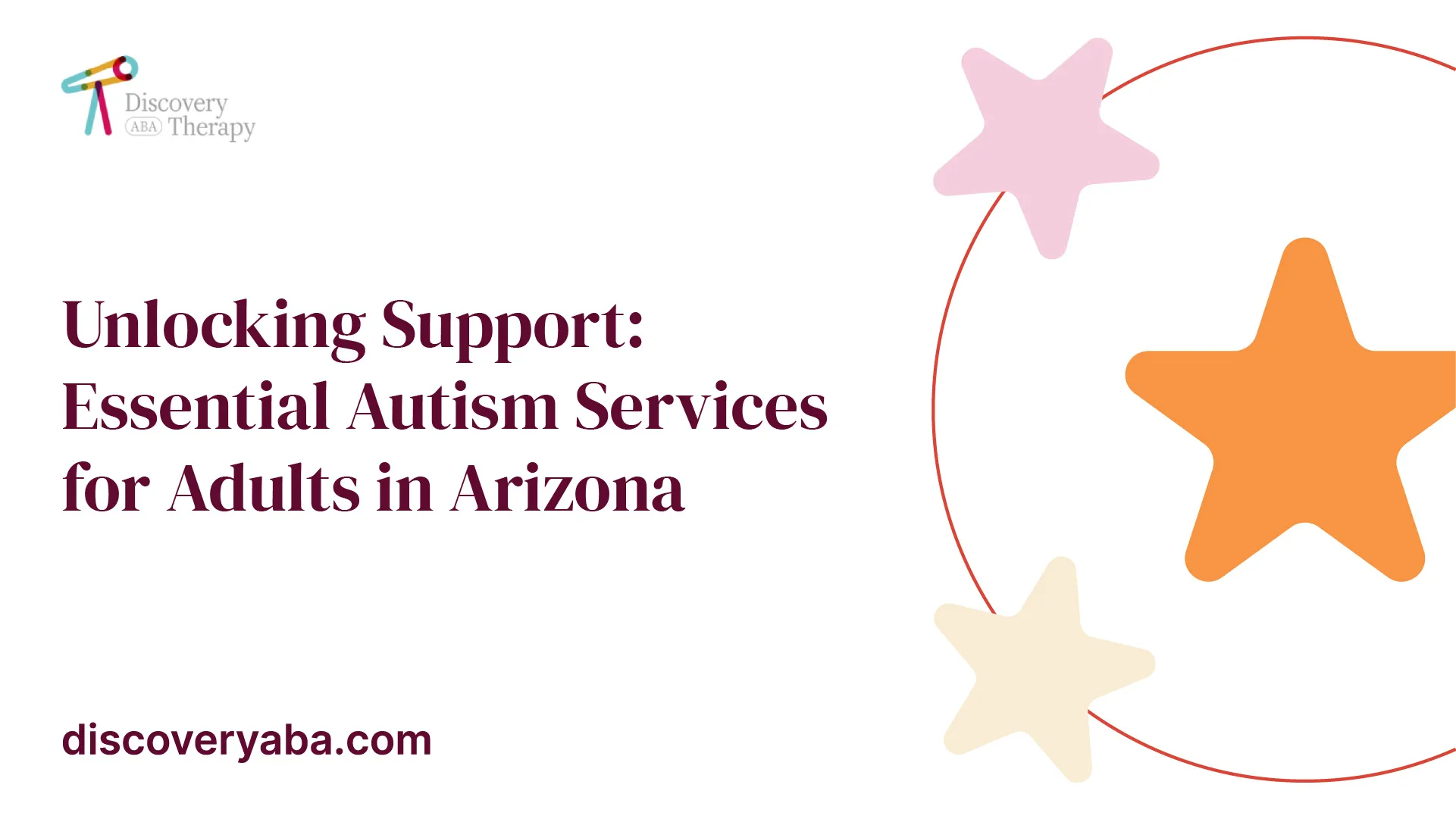Unlocking Support: Essential Autism Services for Adults in Arizona
Discover essential autism services for adults in Arizona. From vocational training to housing support, unlock the support they need.

Autism Services in Arizona
Arizona is home to several leading autism organizations that are dedicated to providing support and services for individuals with autism. These organizations play a crucial role in improving the lives of those on the autism spectrum and their families.
Leading Autism Organizations
- Southwest Autism Research and Resource Center (SARRC): SARRC is a prominent autism organization in Arizona that offers a wide range of services for individuals with autism. They focus on research, education, and providing support to individuals and families affected by autism. SARRC's programs include diagnostic services, early intervention, behavioral therapies, and vocational training.
- Arizona Autism United: Another notable organization in Arizona, Arizona Autism United provides comprehensive autism services for individuals of all ages, including adults. Their services include applied behavior analysis (ABA) therapy, social skills development, occupational therapy, and parent training. They also offer support and resources to help individuals with autism lead fulfilling lives.
- Morningstar Foundation for Adults with Autism: This organization specifically focuses on providing support and resources for adults with autism in Arizona. They aim to enhance the quality of life for adults on the autism spectrum by offering vocational training, independent living skills programs, and social engagement opportunities.
- First Place AZ: While information about the services they provide is limited, First Place AZ is an autism organization in Arizona that likely offers services for adults with autism. Their mission is to create innovative housing and learning options for adults with autism and other special abilities.
- Tucson Alliance for Autism: The Tucson Alliance for Autism plays a role in providing autism services in Arizona that could benefit adults with autism. They offer resources, support groups, and workshops for individuals with autism and their families.

Age Demographics in Arizona
Understanding the age demographics of individuals with autism in Arizona helps shed light on the importance of autism services for adults. While specific data for adults with autism is limited, it is essential to recognize the need for ongoing support as individuals transition into adulthood.
According to the Autism and Developmental Disabilities Monitoring (ADDM) Network, the prevalence of autism in Arizona among 8-year-old children is as follows:

These statistics highlight the continued presence of autism throughout adolescence and into adulthood. It emphasizes the importance of having autism services that cater to the unique needs of adults on the spectrum.
Autism organizations in Arizona have recognized this need and are working diligently to provide valuable resources and services specifically tailored for adults with autism.
Support for Adults with Autism
As individuals with autism transition into adulthood, it is crucial to provide them with the necessary support and resources to lead fulfilling and independent lives. In Arizona, there are several programs and services available to assist adults with autism in their vocational training, employment, and overall transition process.
Vocational Training and Employment
Vocational training programs play a vital role in preparing adults with autism for the workforce. These programs focus on developing essential job skills, enhancing communication abilities, and fostering independence. Through vocational training, individuals with autism can gain the necessary tools to secure and maintain employment.
In Arizona, there are several organizations dedicated to providing autism services for adults, such as:
- Southwest Autism Research and Resource Center (SARRC): SARRC offers vocational training programs designed to equip individuals with autism with relevant job skills and help them find meaningful employment opportunities.
- Arizona Autism United: This organization provides a range of services for individuals with autism, including vocational training and supported employment programs.
- Morningstar Foundation for Adults with Autism: Dedicated specifically to adults with autism, this organization offers support and resources to help individuals with autism navigate vocational training and employment opportunities.
- First Place AZ: While focused on housing options and independent living support, First Place AZ likely provides programs and resources to assist adults with autism in their vocational endeavors.
Transition Services and Programs
Transitioning from school to adulthood can be challenging for individuals with autism. Transition services and programs are designed to help adults with autism navigate this phase of their lives successfully. These services often include guidance on post-secondary education, independent living skills, social integration, and accessing community resources.
Organizations in Arizona, like the Tucson Alliance for Autism, play a role in providing autism services that can benefit adults with autism during their transition to adulthood. These services aim to empower individuals with autism to make informed decisions, set goals, and effectively navigate the complexities of adult life.
By accessing vocational training programs and transition services, adults with autism in Arizona can enhance their skills, increase their independence, and successfully integrate into the workforce and community. These resources provide valuable support and opportunities for individuals on the autism spectrum to thrive and reach their full potential.
Community Resources in Arizona
When it comes to providing comprehensive support for adults with autism in Arizona, there are various community resources available. These resources aim to assist individuals with housing and support services, as well as provide access to disability support groups for additional assistance and connection.
Housing and Support Services
Arizona offers a range of housing and support services tailored to the needs of adults with autism. These services aim to create a supportive and inclusive environment where individuals can thrive. Some notable organizations providing housing and support services in Arizona include:
- First Place Phoenix: First Place Phoenix focuses on creating innovative housing solutions and support for individuals with autism and other special abilities.
- Luna Azul: Luna Azul offers residential options for adults with autism, providing a safe and supportive community.
- The Opportunity Tree: The Opportunity Tree assists individuals with autism in finding housing options that align with their specific needs and preferences.
- Rainbow Acres: Rainbow Acres provides a residential community that supports adults with developmental disabilities, including autism.
- Safe Haven Services: Safe Haven Services offers residential options and support services for individuals with autism, focusing on enhancing their quality of life.
These organizations strive to create inclusive and supportive living environments, allowing adults with autism to lead fulfilling and independent lives.
Disability Support Groups
Connecting with others who share similar experiences can be invaluable for adults with autism. Disability support groups provide a platform for individuals to connect, share resources, and receive emotional support. Some organizations in Arizona offering disability support groups include:
- Autism Society of Greater Phoenix: The Autism Society of Greater Phoenix provides various support groups for individuals with autism and their families, including adults with autism.
- Autism Society of Southern Arizona: The Autism Society of Southern Arizona offers resources and support services for adults with autism, including access to support groups and information about community resources.
- City of Tucson Disability Resources: The City of Tucson Disability Resources serves as a central source of information, providing referrals and assistance to individuals with disabilities, including those with autism.
These support groups foster a sense of community and provide a platform for individuals with autism to share their experiences, receive guidance, and build meaningful connections.
By utilizing the housing and support services available in Arizona, and participating in disability support groups, adults with autism can access the resources and support needed to lead fulfilling and empowered lives.
Health Care Access for Individuals
When it comes to accessing health care for individuals with autism, the Americans with Disabilities Act (ADA) plays a crucial role in ensuring equal access to healthcare services. The ADA is a federal law that prohibits discrimination against individuals with disabilities, including those on the autism spectrum. This section will explore the ADA and how individuals can obtain reasonable accommodations to ensure they receive the necessary care.
Americans with Disabilities Act (ADA)
The Americans with Disabilities Act (ADA) is a comprehensive law that protects the rights of individuals with disabilities, including those with autism, and mandates equal access to various services, including healthcare. Under the ADA, healthcare providers are required to provide reasonable accommodations to individuals with disabilities, ensuring they have equal opportunities to receive quality care.
Reasonable accommodations in healthcare settings are modifications or adjustments made to enable individuals with disabilities, such as autism, to perform tasks they may not be able to do otherwise. These accommodations must be made without causing "undue hardship," which refers to significant difficulty or expense.
It's important to note that healthcare providers may not always be aware of the ADA or its application to their specific practices. In many cases, educating providers about the ADA while discussing personal needs for accommodations proves to be the most effective approach. Accommodations under the ADA can include accessible buildings/facilities and accessible communication/services in healthcare settings.
Obtaining Reasonable Accommodations
Obtaining reasonable accommodations under the ADA in healthcare settings is a process that requires effective communication between the individual and their healthcare provider or office staff. The need for accommodations can vary depending on individual situations and needs. It is essential to communicate these needs clearly to ensure the appropriate accommodations are provided.
The process of obtaining the right accommodations may require more than one visit, and accommodations are likely to change over time. Individuals have the right to seek another healthcare provider if their current provider is not open to working with them to provide the necessary accommodations. It is important to remember that accommodations under the ADA can be negotiated on a case-by-case basis and are considered "reasonable" if they are feasible, plausible, and do not cause undue hardship.
To request ADA accommodations for healthcare, individuals should communicate their needs to their healthcare provider or office staff. It may be helpful to bring documentation or medical records that support the need for specific accommodations. Additionally, individuals can seek guidance from advocacy organizations or support groups specializing in autism to navigate the process and understand their rights under the ADA.
By understanding and utilizing the protections provided by the ADA, individuals with autism can access the healthcare services they need while ensuring their specific needs are met. Effective communication and collaboration with healthcare providers are key to obtaining reasonable accommodations and receiving quality care.
References
Does Your Child Have An Autism Diagnosis?
Learn More About How ABA Therapy Can Help
Find More Articles
Contact us
North Carolina, Nevada, Utah, Virginia
New Hampshire, Maine
Arizona, Colorado, Georgia, New Mexico, Oklahoma, Texas
.avif)




































































































